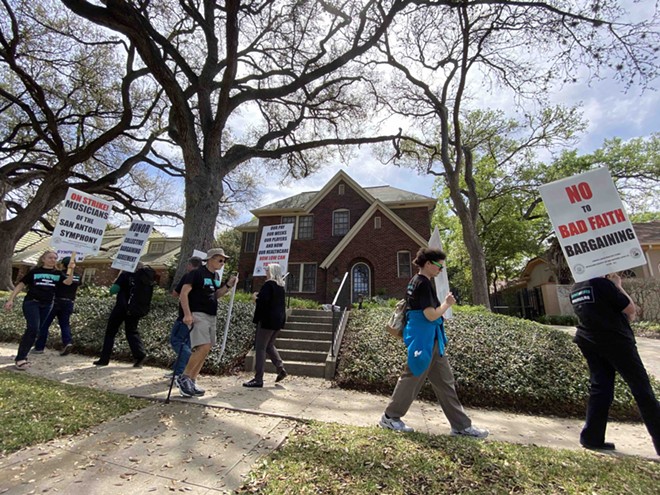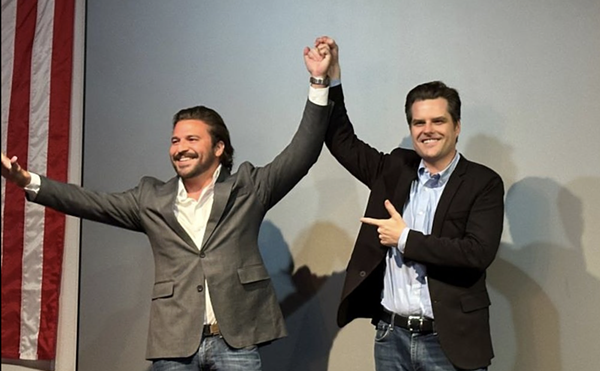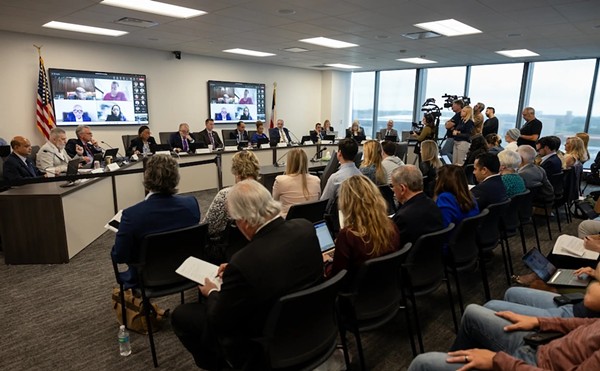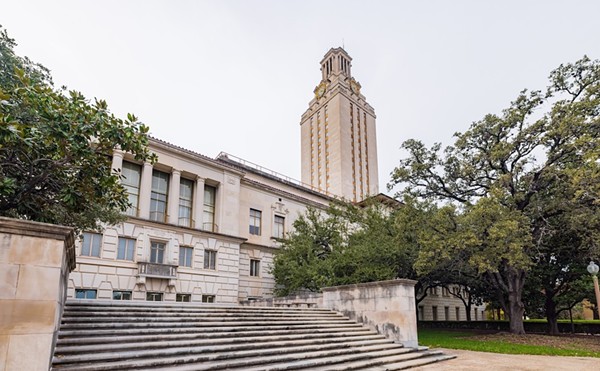
Editor's Note: Current Events is a column of opinion and analysis.
At the end of March, as the San Antonio Symphony strike stretched into its sixth month, the musicians held a rally in front of the Tobin Center to signify the solemn anniversary. Speakers ranging from labor leaders to congressional candidates spoke up for the players' demands that their salaries and benefits not be cut to the core.
Among those voicing support was former Mayor Phil Hardberger. Although unable to attend in person, a representative read Hardberger's letter of support, which praised the musicians and urged a swift resolution to the strike.
"The musicians' cause is just, the demands reasonable," he wrote. "They want a living wage and need health insurance. The musicians give us much for little. Their music soothes the spirit and smooths out the wrinkles of the day."
Hardberger also noted that he frequently used the symphony as a selling point when trying to recruit businesses to the metro. In his words, the orchestra "sets us apart from our competitors" and makes San Antonio a "charmer of a city."
There was a notable absence at the rally.
Mayor Ron Nirenberg — considered by political observers to be Hardberger's protégé — didn't attend. Nor has Nirenberg said much of anything about the strike. Publicly, anyway.
When the Current requested a comment on the walkout's six-month anniversary, a spokesman responded that Nirenberg is unwilling to comment while a federal mediator is working on a resolution.
Editor's Note: Since this story was originally posted, the spokesman reached out again to clarify that Nirenberg wants a "full-size, fairly paid symphony for San Antonio," but added that the mayor "can't get in the middle of federal mediation."
However, Nirenberg does have a history of intervening when it comes to the city's perpetually troubled symphony. During the organization's 2017 financial crisis, he and Bexar County Judge Nelson Wolff created a nine-member city-county task force to help put it on a path to financial stability.
It also seems that Nirenberg should show at least a little concern that the symphony management's proposal to cut the size of the orchestra and slash pay and benefits — the trigger for the strike — directly contradicts the recommendations of the DeVos Institute, a consulting group hired by the task force Nirenberg helped create.
DeVos is helmed by Michael Kaiser, renowned for helping turn around other troubled musical organizations. During his time working with the San Antonio Symphony, Kaiser said the orchestra's managing body shouldn't scale it back from 72 members or slash its 30-week performance schedule.
"A lot of people think it starts with cutting your budgets or saving money — it doesn't," Kaiser told Texas Public Radio at the time. "You don't save your way to health and the arts; you excite people; you energize people."
Kaiser suggested changes such as having the symphony back popular touring artists and boost its social media savvy. Largely, though, he put the emphasis on management increasing its fundraising prowess. The money is here, he noted.
"This community is very generous with contributions," Kaiser said. "If you do a good job of maintaining the level of the excitement after the work and the engagement with the individual."
Without naming Nirenberg, Musicians of the San Antonio Symphony chair Mary Ellen Goree expressed frustration that high-level city officials haven't spoken up during the current crisis. Especially since management appears to have put Kaiser's recommendation through the shredder.
"They dismissed all of his advice," Goree said in an interview the day after the Tobin rally. "It's extremely frustrating that someone of Michael Kaiser's status came and told them not to cut the size of the symphony and they just dismissed him."
So, given what's at stake for one of the city's artistic crown jewels and the management's apparent disregard for 2017's suggested course of action, is the mayor reluctant to weigh in?
Could Nirenberg be afraid that signaling support for the musicians and their demands would suggest he's not willing to do the bidding of the city's anti-labor business community?
Could he be concerned what signal he might send to San Antonio banker J. Bruce Bugg, the deep-pocketed Republican donor who oversees the Tobin Endowment?
Could he simply not believe that a full-size symphony comprised of adequately compensated professional musicians is essential to San Antonio?
Until the Nirenberg is willing to speak up and follow the example of strong leadership set by his mentor, Phil Hardberger, it's anyone's guess
Meanwhile, the musicians — and San Antonians who appreciate their artistry — are waiting.
Stay on top of San Antonio news and views. Sign up for our Weekly Headlines Newsletter.



















